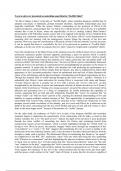‘Love is only ever presented as something superficial in ‘Twelfth Night’’
“So full of shapes is fancy” in the play of ‘Twelfth Night’, where countless disguises, whether they be
adopted consciously or habitually, prompt mistaken identities, improbable relationships and, most
tragically, heartbreak. While the actress Tointon, commenting on her portrayal of Olivia in the
Godwin production, acknowledges that “we fall in love with the person” above all else, it is debatable
whether this is true in Illyria, where the superficiality of love is striking. Indeed, Duke Orsino’s
preoccupation with Petrarchan notions causes him to be trapped in his fantasy of love, hindered from
forming true emotional connections with the subjects of his desire; Olivia’s swift abandonment of
mourning after her meeting with the androgynous Cesario brings the sincerity of her love into
question. However, upon the consideration of the purity of both Viola and Antontio’s servile devotion,
it can be argued that there is a possibility for love to be perceived as genuine in ‘Twelfth Night’,
although, as in the case of the sea captain, this love often “cannot be reciprocated or gratified” (Kott).
From the introduction of the Duke Orsino in the opening scene, the artificial nature of love among the
aristocratic characters quickly becomes apparent, presenting a quest for passion which is entirely
motivated by egotism. Indeed, Baker notes that “Duke Orsino is a narcissistic fool”, which is clearly
evident in his deluded belief that he has authority over Cupid, certain that “the rich golden shaft” will
soon have killed “the flock of all affections else”; the news of Olivia’s grief is immediately dismissed,
turning the focus to his potential as a patriarchal power and highlighting his ignorance to the beauty of
genuine emotion. It seems that the duke’s sole attention lies with perfecting his performance as a
courtier and any reminder of Olivia simply fuels his fantasy; this idea is emphasised his dishevelled
appearance in the Luscombe production, where his unbuttoned shirt and lack of shoes illustrates the
extent of his self-delusion and the physical impact of maintaining such fictional expectations for love.
Through the semantic field of wealth running throughout this scene (“rich”, “golden”, “thrones), it is
undeniable that Orsino’s main motivation for wooing Olivia is concerned with status and finance;
Crowder observes that he is actually not in love with a person, but “in love with love”, an idea
strengthened by his boasting of power and subsequent criticism of female devotion in Act 2 Scene 4.
Indeed, while he professes a “beating of so strong a passion”, proud of the almost violent nature of his
affection and presenting love as a thing of competition, he swiftly diminishes the capability of
women, suggesting they are frail and only temporarily beautiful like “roses”; he surmises that “no
woman’s heart” can “hold so much” passion as his, exposing his distorted understanding of love and
inability to express authentic emotion because of this. This superficiality is maintained even in his
relationship with Cesario/Viola, during which his attraction to her “rubious lip” blinds him as Viola
attempts several subtle revelations of her identity; just as it were with Olivia, he is oblivious to the
depth of her grief, concerning both the loss of her brother and sense of self, and only wishes to “have
share in this most happy wreck” because of the promise of a “noble” dynasty.
On the other hand, the endurance of Viola’s love in spite of her frequent rebuffals and secondary
treatment begins to undermine the superficiality of her relationship with the duke, so much so that
Tonkin considers her to be “the spirit of love”. Indeed, the depth of her devotion is most prominent
through her inner conflict of concealing her desire for Orsino and restraining herself from
transgressing master-servant boundaries, which is clearly highlighted through her “barful strife” of
having to woo Olivia by proxy; the parasitic imagery which arises through her comparison of this
“concealment” to a “worm i’ th’ bud” suggests that maintaining her role as wooer is leading to the
destruction of her true feminine identity, and it is her devotion to the duke which provides her with the
strength to make such a sacrifice. The detrimental effects of maintaining this facade as “an eunuch”
are emphasised in the RSC 2017 production, where Viola sits while delivering this line, paralleling
with “Patience on a monument” and thus highlighting the physical weakness which arises by having
to mask such an intense love; Crowder claims that this “unwavering affection” makes her “the only
‘true’ character in the play”, suggesting that Viola’s sincerity acts as a rare yet necessary intermission
in the superficiality which prevails in Illyria. Indeed, this notion is epitomized in Act 5 Scene 1, where
Viola equates the constancy of her love to the “orbed continent the fire that severs day from night”
and thus poses a stark contrast to the “opal” mind of Orsino; it seems that her devotion is capable of




